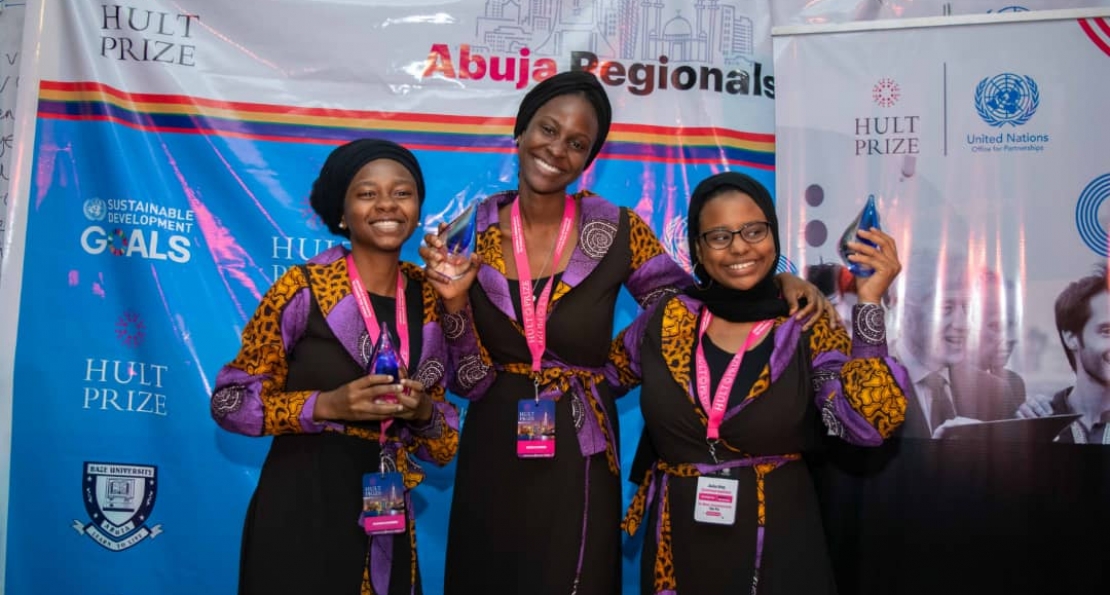Introduced first in 2014, vying to participate in AUN's Hult Prize has been a major highlight for students. This year, Faculty Advisor Fardeen Dodo and Campus Coordinator, Mirian Fonkam, both brought to bear previous experiences competing for the Hult Prize. They put in their very best to ensure AUN stands a good chance at winning the regional event.
The Hult Prize is the world's biggest engine for the launch of for-good, for-profit startups emerging from university with over 2500 staff and volunteers around the world. In nearly a decade, the movement has deployed more than $50M of capital into the sector and mobilized more than one million young people to re-think the future of business as it continues to breed disruptive innovation on college and university campuses across 120 plus countries. The Hult Prize Foundation has been called the "Nobel Prize for Students" and has been featured in a TIME Magazine Cover Story highlighting the "Top 5 Ideas Changing the World."
This year's regional competition was held at Baze University in Abuja on the 20th and 21st of March, 2020. After the first round of the competition, AUN’s Team Global Citizens emerged among the top six, and at the end of the second round, the judges announced them as winners of the overall competition.
Having won the regional competition, AUN's Team Global Citizens will now represent Nigeria in the Hult Prize Accelerator, which is a six week boot camp to help winning teams from around the world perfect their business models and get through commercial trials. After the accelerator, they will proceed to the final round of the competition in the United Nations headquarters, where they will compete against winning teams from around the world. If they succeed at the final round, they will be given a 1-million-dollar grant by President Bill Clinton to use in launching their businesses.
AUN's participation in this regional competition was made possible by the generous contributions of Dean Attahir Yusuf, on behalf of the AUN Center for Entrepreneurship, which bore two-thirds of the entire costs, and Dean Byron Bullock of Student Affairs Division, who underwrote the costs of the students' participation.
But, how did we get here?
On November 8, 2019, organizers ensured that an on-campus trial event was a close simulation of the regional competition in terms of format and number of teams as well as leveraging AUN's top talents.
First, the on-campus event had the highest number of student participants in the history of the Hult Prize at AUN, with more than 130 students (as opposed to 50 students the previous year). This provided a robust environment for competitiveness, yielding the very best teams to qualify for the finals. This event was made possible by funding from the Student Government Association (contributing 50% of funds), and the Entrepreneurship Center. The Student Affairs division also provided support in-kind.
Second, the judges for the on-campus event were very diverse – from many professional backgrounds and walks of life. This ensured the quality and diversity of judging candidates.
Third, the participants had a chance to engage with the community and industry to which their ventures were related. With the help of AUN's transportation unit and favorite driver, Bello, the organizing team visited villages, companies, and entrepreneurs operating in areas relevant to the competing teams to gain more perspectives on key issues and seek help with prototyping the students' ideas.
Finally, the levels of exposure among participants have strongly helped their success at the Hult Prize regionals. Out of the 9 , six had prior experiences with international competitions and events, such as Model UN, Hult Prize, Facebook P2P challenge and study-abroad opportunities. This was reflected in how the teams did the thorough groundwork, prepared and practiced their pitches and ultimately succeeded at the national level.
At the end of the on-campus competitions, three teams qualified for the regional competition, including Global Citizens (Hauwa Hamidu, Amira Hamid and Aisha Mai), Repel+ (Ahmed Haruna, Mohammed Chubado Ahmed and Raihanat Munguno), and A-team (Firdaws Yahya, Kafilat Akintoye and Aisha Modibbo). Here is a brief of the ideas of the respective teams:
- Global Citizens: They want to build a business that collects and composts human and animal fecal wastes through organic public utilities and composting toilets. From this, the venture will then manufacture and sell high-quality soil conditioner that organically fertilizes farms and reduces the need for artificial, inorganic fertilizers. By the time of the regionals, the team had already built a prototype and had a sample of their fertilizer in hand.
- Repel+: Team Repel's idea is to develop organic and natural perfumes that repel mosquitoes and other bugs that reduce the menace of malaria. Using a unique combination of lemon, lavender, lemongrass, and grapefruit, the team has found a formula that can serve both as a natural deodorant and a strong repellent for mosquitoes. Led by freshman Ahmed Haruna, Repel+ has already developed prototypes leveraging help available in our laboratories.
- A-Team: This team's idea is to develop a replacement for single-use plastic take away packs through developing locally made packaging material from sugarcane bagasse. Their products would be compostable, easy to manufacture and non-toxic to marine life.
These ideas represent the very best of ideas pitched during the on-campus event and most importantly, maximize the chances for AUN during the regional competition.
Reported by Fardeen Dodo, Instructor, SBE


